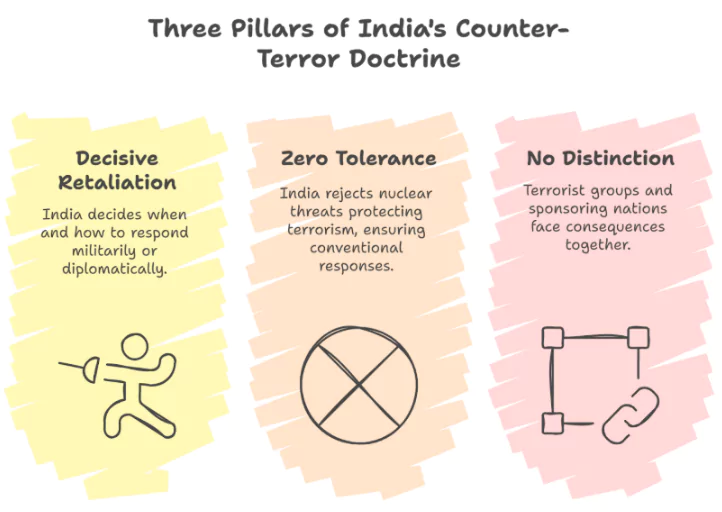“Gandhi’s non-violence principle remains crucial today amid Pakistan-sponsored cross-border terrorism,” said BJP MP Ravi Shankar Prasad in London while leading an all-party delegation after the Pahalgam terror attack.
Gandhian Principles
Mahatma Gandhi’s core principles, also known as Gandhian principles, revolve around truth (Satya), non-violence (Ahimsa), and self-reliance.
- These principles, along with others like truthfulness, non-stealing, non-possessiveness, and fearlessness, guide his philosophy and methods for achieving social and political change.
| “An eye for an eye only ends up making the whole world blind.” Mahatma Gandhi |
- Non-Violence (Ahimsa): Core to Gandhian philosophy, Ahimsa advocates against all forms of violence—physical, verbal, or psychological.
- Non-violence is seen as a moral force stronger than weapons.
- Truth (Satya): Gandhi believed truth (Satya) is the highest moral virtue, fundamental to personal integrity and social justice.
| “I do believe that where there is only a choice between cowardice and violence I would advise violence.” |
- Self-Reliance (Swadeshi): Advocates for self-sufficiency in economic, political, and social spheres, emphasizing local production and community empowerment.
- Amity and Goodwill (Sadbhav): Sadbhav emphasizes goodwill, harmony, and mutual respect among people, fostering positive relationships and a peaceful coexistence.
- Sarvodaya (Universal Upliftment): The welfare of all is central to Gandhi’s vision. Sarvodaya means ensuring that the last person in society benefits from progress.Moral Courage and Resistance: Moral courage is the ability to stand firm in the face of adversity, remaining true to ethical values and justice without resorting to violence.
- Non-Cooperation (Satyagraha): Gandhi’s Satyagraha advocates for non-cooperation with unjust systems and regimes, through peaceful resistance to oppression.
Gandhi and Terrorism
- Gandhi’s Approach to Preventing Terrorism
- Confronting the Root Causes: Gandhi believed that focusing solely on the acts of terrorism would be akin to addressing symptoms rather than the root causes.
- Stop Violence in Its Tracks: Gandhi suggested that efforts to stop violence must be non-violent but forceful, focusing on creating positive societal change to deter violent acts.
- Non-Violence as Power: Gandhi believed that non-violence was the most powerful force. Retaliation and violence only escalate conflict and suffering.
- Terrorism is often fueled by cycles of violence, which create more hatred and distrust between nations. Gandhi’s principle of non-violence challenges this dynamic.
- Economic Resilience: Promotes local empowerment and economic opportunities to reduce vulnerability to terrorism.
- Community-Led Security: Encourages local intelligence networks and community-based peacebuilding rather than foreign military intervention.
- Internationalism and Peace: Gandhi’s vision of national security was not confined to India.
- He believed in the global interconnectedness of humanity and advocated for international cooperation to address issues like terrorism and injustice.
- Global Brotherhood: Gandhi’s belief in global peace and mutual respect remains highly relevant in today’s world, where cross-border terrorism requires international collaboration to address its root causes.
- Means vs. Ends in Gandhian Philosophy
- Ethical Consistency: Gandhi maintained that the means used to achieve a goal must align with the goal itself.
- For Gandhi, there could be no justification for violent means to achieve any political or social objective, including terrorism.
- Truth and Non-Violence as Means: Gandhi believed that truth and non-violence should be the guiding principles of any movement, and that violence only corrupts the people involved, regardless of their cause.
- Gandhi believed truth exposes terrorism and its sponsors. Transparency is key in holding terrorists and states accountable.
Gandhi’s Ethical Framework in the Context Of Modern Warfare
- Alternative to Traditional Warfare: Gandhi’s ethics suggest alternatives to conventional methods of war, including diplomatic engagement, soft power, and fostering a culture of peace rather than escalation.
- In the context of cross-border terrorism, non-violent approaches could include addressing international law violations, advocating for universal human rights, and promoting international cooperation.
- Strategic Non-Violence: Gandhi’s approach to civil disobedience and non-cooperation was a non-violent resistance strategy.
- In the case of cross-border terrorism, countries could engage in non-violent resistance to harmful actions through economic sanctions, international isolation, and diplomatic pressure rather than resorting to violence.
Gandhi and India’s Counter-Terrorism Strategy

- Operation Sindoor: In response to the terror attack in Pahalgam (2025), India adopted a strategy of decisive retaliation while ensuring restraint to avoid escalation, reflecting Gandhi’s influence on strategic patience and moral restraint.
- Transparency: Promotes accountability and human rights in counter-terrorism operations, ensuring no harm to civilians.
- No First Use (NFU) Policy: Gandhi’s influence is evident in India’s nuclear doctrine, particularly its policy of No First Use, which emphasizes restraint and non-aggression.
- Non-Cooperation with Terrorism: Encourages society to refuse to support terrorist organizations, boycott terrorism, and reject violence.
- “My non-violence does not admit of running away from danger.”
- ‘’I WOULD risk violence a thousand times rather than risk the emasculation of a whole race.’’
|
-
- India’s Policy of ‘’terror and talks cannot go together.’’
- Global Outreach and Advocacy: Through initiatives like the All-Party Delegation, India has emphasized truth and non-violence in its efforts to raise global awareness about state-sponsored terrorism, echoing Gandhi’s emphasis on global peace and truth-telling in diplomatic efforts.
- Building Trust: Promotes cooperation and trust-building between nations, communities, and individuals, which is essential in countering terrorism and resolving conflicts.
Challenges in Adopting Gandhian Principles in Counter-Terrorism
- Realpolitik vs. Non-Violence: Modern diplomacy often focuses on national security and military intervention, whereas Gandhi’s philosophy of non-violence requires moral engagement.
- The War on Terror post-9/11, initiated by the U.S., relied heavily on military actions (e.g., Iraq War, Afghanistan Invasion) to counter terrorism, in stark contrast to Gandhi’s principle of non-violence and dialogue.
- The Need for Immediate Responses: Modern terrorism demands immediate responses, often military, whereas Gandhi’s preventive approach focuses on long-term solutions to address root causes.
- Political and Religious Extremism: Extremist ideologies justify violence in the name of religion or politics, making Gandhi’s non-violent resistance seem ineffective.
- Groups like ISIS or Al-Qaeda justify violence through religious extremism.
- Technological Warfare: Technological advancements in cyber-attacks, drone warfare, and nuclear weapons complicate Gandhi’s non-violent approach, as these tools enable indiscriminate violence.
- Drone strikes have killed thousands of civilians in conflict zones, violating human rights and undermining Gandhi’s vision of non-violent conflict resolution.
- Information War: The digital age has made it challenging to discern the truth amidst the massive flow of misinformation, and while truth is a powerful weapon, it can be difficult to combat deep fakes, state-sponsored propaganda, and echo chambers that spread falsehoods.
- Global Power Structures and Self-Interest: Global power structures prioritize self-interest and military dominance over cooperation and human welfare, which Gandhi envisioned in global diplomacy.
- The U.S.-led invasion of Iraq in 2003 was justified by national security concerns and geopolitical interests, rather than humanitarian concerns or Gandhian ideals of peace and diplomacy.
Way Forward: Adopting Gandhian Principles in Counter-Terrorism
- Emphasizing Long-Term Preventive Measures: Focus on root causes like poverty and social inequality, not just military actions.
- Educational programs and economic development in vulnerable regions can reduce the appeal of terrorism.
- Promoting Global Cooperation and Dialogue: Shift focus from military interventions to dialogue and peacebuilding.
- Nations should push for non-violent diplomacy as the primary method of addressing international disputes.
- Shifting Focus to Human Security: Prioritize human security by addressing human rights, health, and education.
- Counter-terrorism programs should focus on human development, not just defense.
- Promoting Disarmament and Non-Violent Diplomacy: Advocate for disarmament and non-violent diplomacy over military force.
- UN Disarmament efforts align with Gandhi’s vision for a nuclear-free world.
- Addressing Ideological Radicalization through Education: Focus on education to prevent radicalization and foster tolerance.
- Peace education and interfaith dialogues help counter extremist ideologies.
- Integrating Non-Violent Resistance in Security Strategies: In situations where terrorism involves state-sponsored violence or oppressive regimes, non-violent resistance can be a powerful strategy.
- Encouraging civil disobedience and non-cooperation movements as Gandhian methods can mobilize citizens without resorting to violence.
- Building a Culture of Tolerance and Understanding: Promote social cohesion, tolerance, and understanding between different communities.
- Cultural exchange programs and dialogue between religious groups reduce tensions.
Conclusion
Gandhi’s principles of non-violence, truth, and goodwill provide a moral compass for countering cross-border terrorism, balancing decisive action with systemic reforms. By integrating these ideals into India’s counter-terrorism strategy, as seen in Operation Sindoor and NFU, India can address terrorism’s roots while fostering global peace.
- Gandhi’s philosophy offers a pathway to resolve conflicts, restore justice, and rebuild trust between nations and communities.
![]() 4 Jun 2025
4 Jun 2025

